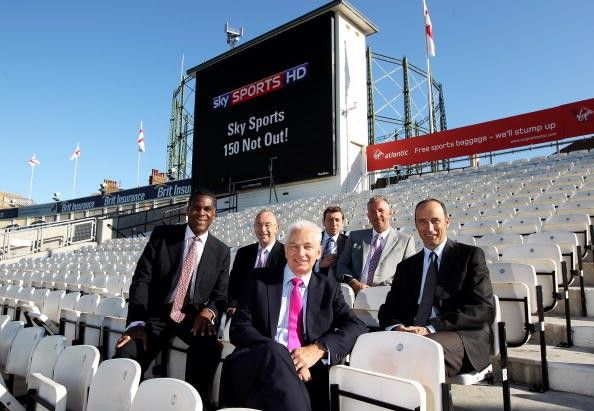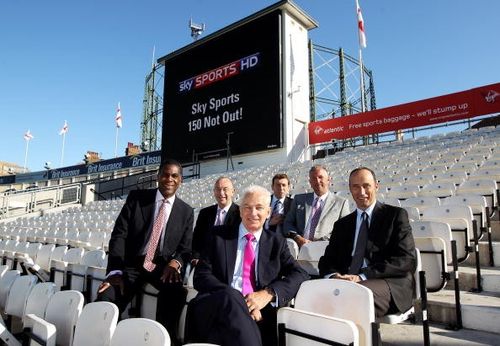
Why the arrival of BT Sport in the UK is exciting for English cricket's future

For decades, Sky Sports has dominated cricket coverage in the United Kingdom, all but securing a monopoly on the game. Their commentary team, which boasts Michael Atherton, Nasser Hussain, Michael Holding and David “Bumble” Lloyd, is renowned worldwide. Their cricket programming makes a strong case for being the best in the world, and they have shown every major England tour since 1990. However, with the arrival of BT Sport, that status quo is set to change.
British TV’s new kid on the block has just secured exclusive rights to air England’s Ashes tour Down Under in 2017/18, as part of a five-year deal with Cricket Australia to broadcast all of its international matches from 2016, as well as the Big Bash.
BT Sport vs Sky Sports
BT Sport has already forced its way into the football equation - buying exclusive rights to the UEFA Champions League for just under £900 million (Rs. 9000 crore) - and now they look set on breaking Sky’s cricket stranglehold too.
While losing Australia’s home matches - one of the staples of their late-night winter broadcasting - it is relinquishing the Ashes that will hurt Sky the most. And although they have allowed some other international series go further afield when it comes to England, they have always been keen to keep the rights on a tight leash. BT paid £80 million for the Cricket Australia deal, a price Sky thought to be an overvaluation.
In another key move, BT Sport has also pledged to show one live game a week on their new free-to-air channel. Live international cricket has not been available on non-pay TV in the UK since 2005. Ironically, the only cricket that has been free-to-air in the past decade is the Indian Premier League (IPL).
What’s more, BT Sport may not be finished with their heist. With a deal not yet made for England’s upcoming series against Pakistan in the UAE, there have been reports that Sky could be usurped once more. And with the Pakistan Cricket Board struggling financially, any past loyalty with Sky would likely be disregarded if the price was right.
Sky Sports has faced competition over the years but have always been able to force rivals out of the market - Setanta Sports and ESPN left almost as quickly as they arrived. However, BT Sport presents a much difference challenge to the Rupert Murdoch-founded company.

BT Group is already an established company in the UK, as the country’s primary provider of telephony and broadband. Thus, when it came to entering the sports industry a little over two years ago, they already had a substantial client base to tap into - almost seven million at the time - unlike their failed predecessors. Upon launching, BT offered their sports package free with current broadband subscribers, and even for those who don’t have BT’s internet, their sports channels cost just £20 (Rs. 2000) per month. Compared with Sky Sports, which typically has to be bought as part of an overall TV package, BT Sport is far more accessible to the public.
And BT can afford it too. In 2014, BT Group made over £2 billion (Rs. 20,000 crores) in profit; Sky plc made a little over half of that. So, while it may look like BT is being reckless with its spending on rights and undercuts to lure customers, they have the purchasing power to do so and, in the long run, it may pay dividends.
Right now, Sky Sports still hold the majority of the aces when it comes to Britain’s most popular sports. They show three times more English Premier League matches than BT Sport (at a cost of £11 million each), broadcast every Formula One race live and have the lion’s share of tennis, golf and darts coverage. However, with BT’s intentions, a more shared landscape in a few years looks inevitable.
Could county cricket benefit long-term?
While BT Sport's moves may seem like a big deal now, they could be just a drop in the ocean compared to what happens in 18 months’ time, when the broadcasting rights for international and domestic cricket in England come up for grabs. While there is little doubt that the international game will be in good hands whether there is a solo broadcaster or a joint agreement, the future of the county game is perhaps more interesting.
County cricket lags far behind almost every other major cricketing nation when it comes to coverage. While India, Australia, and West Indies boast major T20 leagues which beam every single match live across the world, England's T20 Blast has just a fraction of its games broadcast, and that is a crying shame. The IPL, Big Bash, and Caribbean Premier League all have major deals in the UK, but the country’s own T20 tournament has been consistently neglected.
What benefit is there for Chris Gayle's unbeaten 151 off 62 balls for Somerset this year - which made headlines across the world - to be survived only by the scorecard and the anecdotes of those in attendance? Zero. And with cricket participation levels in the UK dropping year-on-year, bringing top quality domestic cricket to the public is essential for the game's growth.
If BT Sport is serious in making further inroads, then perhaps they could strike a county deal with the England and Wales Cricket Board (ECB). Whether it's showing more live games, producing a comprehensive highlights package or pushing for a franchise-based system - something considered taboo my many counties - a new broadcaster would almost certainly bring domestic matches to TV that would otherwise be lost, and that can only be a good thing.
Franchising the game in England seems the logical move from a business standpoint, however, with 18 counties, such a system with the current domestic system is unworkable. So far, counties have rejected the concept of combining to form city-based franchises for a T20 league.
Those critical cite their ability to fill grounds on a regular basis, but many counties do not enjoy such a luxury. Attendances have improved substantially in 2015, but the general trend in recent years has been a worrying downwards one. County cricket may have to adapt to survive.
Change happens quickly in sport, very quickly. Just 15 years ago Twenty20 did not exist as a professional format, who can say where the game will be in five years, never mind 15. If a revolutionary T20 idea is put on the table, county cricket may have to take a leap of faith.
It is true that football is, and always will be the golden goose as far as British sports rights are concerned, but cricket is still vitally important for TV networks - in Sky Sports' case, it is the foundation of their summer scheduling.
For the first time in 25 years, a turf war is taking place over England’s most quintessential game. This competition is healthy and suggests that the sport, which has been meandering without direction in its motherland, could be transformed. English cricket’s future has never been more exciting.